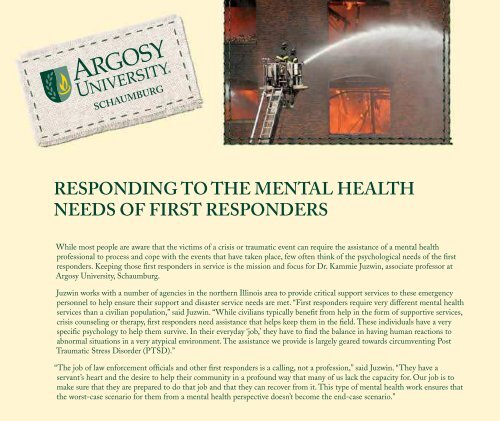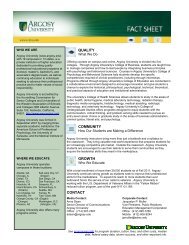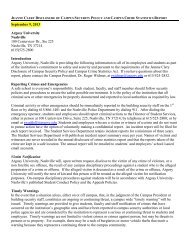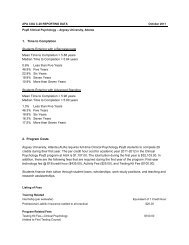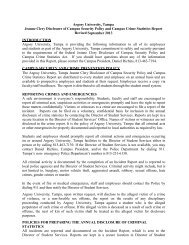The Future. - Argosy University
The Future. - Argosy University
The Future. - Argosy University
Create successful ePaper yourself
Turn your PDF publications into a flip-book with our unique Google optimized e-Paper software.
SchaumburgResponding to the Mental HealthNeeds of First RespondersWhile most people are aware that the victims of a crisis or traumatic event can require the assistance of a mental healthprofessional to process and cope with the events that have taken place, few often think of the psychological needs of the firstresponders. Keeping those first responders in service is the mission and focus for Dr. Kammie Juzwin, associate professor at<strong>Argosy</strong> <strong>University</strong>, Schaumburg.Juzwin works with a number of agencies in the northern Illinois area to provide critical support services to these emergencypersonnel to help ensure their support and disaster service needs are met. “First responders require very different mental healthservices than a civilian population,” said Juzwin. “While civilians typically benefit from help in the form of supportive services,crisis counseling or therapy, first responders need assistance that helps keep them in the field. <strong>The</strong>se individuals have a veryspecific psychology to help them survive. In their everyday ‘job,’ they have to find the balance in having human reactions toabnormal situations in a very atypical environment. <strong>The</strong> assistance we provide is largely geared towards circumventing PostTraumatic Stress Disorder (PTSD).”“<strong>The</strong> job of law enforcement officials and other first responders is a calling, not a profession,” said Juzwin. “<strong>The</strong>y have aservant’s heart and the desire to help their community in a profound way that many of us lack the capacity for. Our job is tomake sure that they are prepared to do that job and that they can recover from it. This type of mental health work ensures thatthe worst-case scenario for them from a mental health perspective doesn’t become the end-case scenario.”Juzwin serves in a number of capacities for the Northern Illinois CriticalIncident Stress Management Team as a mental health team responderand education co-chair. Through the agency, she responds on-site andpost-incident, acting as a team contact. From there, Juzwin becameinvolved with the Illinois Medical Emergency Response Team, serving asa volunteer mental health responder and regional coordinator for mentalhealth. As a member of the team, she provides mental health criticalincident assessment and intervention, helping debrief first respondersto help avoid PTSD and other stress responses. Juzwin also works asa federal level mental health team responder for the Illinois-2 DisasterMedical Assistance Team. <strong>The</strong> agency, upon activation by the governorof Illinois, establishes medical field hospitals for large-scale eventsand incidents.“It can be a surreal experience to watch a high-profile emergency on amajor news network and to get the call to come down to the commandpost to assist,” said Juzwin. “It reminds you that you are part of somethingmuch greater than yourself. It is a responsibility, a privilege and an honorto be the person called in to help.”“<strong>The</strong>re’s a profound sense of pride and belonging when first respondersbegin to accept you as one of their own,” said Juzwin. “It’s immensevalidation that the work we do has an impact and makes a difference intheir ability to remain in service.”


